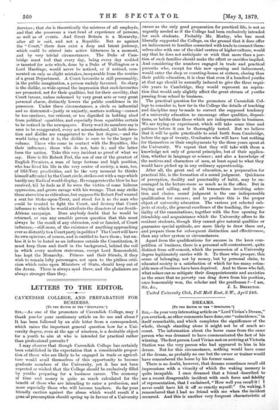LETTERS TO THE EDITOR.
CAVENDISH COLLEGE, AND PREPARATION FOR BUSINESS.
[To THE EDITOR OF THE SPECTATOR."] SIR,—As one of the promoters of Cavendish College, may I thank you for your cautionary article on its use and abuse ? It has been followed by an able letter from a correspondent, which raises the important general question how far a Uni- versity degree, even at the age of nineteen, is a desirable object for a youth to aim at who is intended for practical rather than professional pursuits ?
I may observe that though Cavendish College has certainly been established in the expectation that a considerable propor- tion of those who are likely to be engaged in trade or agricul- ture would avail themselves of this opportunity to become graduate members of the University, yet it has not been expected or wished that the College should be exclusively filled by youths preparing for a business career. The economy of time and money is quite as much calculated for the benefit of those who are intending to enter a profession, and more especially those who will become teachers. So far your friendly caution against the abuse which would result if a gene: al presumption should spring up in favour of a University career as the only good preparation for practical life, is not so urgently needed as if the College had been exclusively intended for such students. Probably Mr. Morley, who has most liberally supported the College, on the ground that it does offer an inducement to families connected with trade to connect them- selves also with one of the chief centres of higher culture, would say that he does not anticipate or wish that more than a por- tion of such families should make the effort or sacrifice implied. And considering the numbers engaged in trade and practical pursuits who, except for this new opening and inducement, would enter the shop or counting-house at sixteen, closing thus their public education, it is clear that even if a hundred youths at that age should be annually induced to give the three requi- site years to Cambridge, they would represent an aspira- tion that would only slightly affect the great stream of youths passing from school to business.
The practical question for the promoters of Cavendish Col- lege to consider is, how far in the College the details of teaching and discipline may be made to correct the supposed tendency of a university education to encourage other qualities, disposi- tions, or habits than those which are indispensable in business. We are trying an experiment, which will take some time and patience before it can be thoroughly tested. But we believe that it will be quite practicable to send forth from Cambridge, before the age of twenty, Graduates who will have lost nothing for themselves or their employments by the three years spent at the University. We repeat that they will take with them a knowledge not only of general principles, but of their applica- tion, whether in language or science ; and also a knowledge of the motives and characters of men, at least equal to what they would have picked up in any ordinary appenticeship.
After all, the great end of education, as a preparation for practical life, is the formation of a sound judgment. Quickness of perception, docility and punctuality of habit, may be en- couraged in the lecture-room as much as in the office. But in buying and selling, and in all transactions involving selec- tion and choice, sound judgment is the one indispensable qualification for success; and to produce this is the proper object of university education. The various yet selected sub- jects of study, the general excellence of the teaching, the impar- tiality of the examinations, together with the free opening for friendship and acquaintance which the University offers to its resident students, though they cannot give natural qualities or guarantee special aptitude, are more likely to draw these out, and prepare them for subsequent distinction and effectiveness, than any other system or circumstances.
Apart from the qualifications for success in the keen com- petition of business, there is a personal self-contentment, quite distinct from self-conceit, which the possession of a University degree legitimately carries with it. To those who prosper, this sense of belonging, not by money, but by personal claim, to educated society is a satisfaction of which far too many estim- able men of business have been deprived. And to those who fail, what solace can so mitigate their disappointments and anxieties as the sense that no poverty can drag down from his position, once honourably won, the scholar and the gentleman P—I am,
United University Club, Tall Mall East, S.W., April 24th.


































 Previous page
Previous page